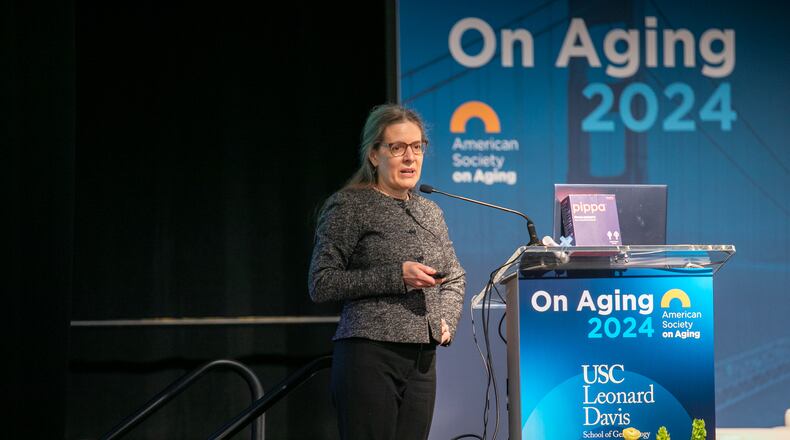Urinary incontinence affects millions of women, especially those in the senior age bracket. According to the Mayo Clinic, as many as 50% of women experience some form of leakage, and that number rises to around 75% in women over the age of 65.
The condition can cause anxiety and isolation for those who have it, but an Atlanta-based innovator is leading efforts to relieve their discomfort, and participants in the efforts she’s overseen are already reporting successes.
Support for women
The company’s overall goal is to put urinary continence management more squarely in the hands of those experiencing it.
“We’re on a mission to give women effective, affordable, appealing alternatives to incontinence pads and surgery … to give consumers the ability to take care of these things for themselves up to a certain point,” said Melody Roberts, CEO and co-founder of Liv Labs.
A significant part of that goal lies in the success of a device the company is developing: the Pippa Pessary.
“We’re developing a simple medical device that is worn intravaginally, just like a tampon or menstrual cup,” Roberts said. “That simple device presses through the vaginal tissue against the urethra to prevent leakage. It’s a mechanical fix.”
The pessary, she said, is in Food and Drug Administration trials now, and Liv Labs anticipates FDA approval as early as next year. Meanwhile, the company is working on a digital health platform to support women looking to make behavioral and exercise changes known to support rehabilitation and reduce or even eliminate leaking. A separate, stand-alone coaching also began in January.
Seed money and study results
Liv Labs patented its device in 2017 and began raising capital in 2021. The company has now brought in $2.6 million in pre-seed funding from private investors and backers like The National Science Foundation: The first funds arrived in the form of a $1.67 million Eunice Kennedy Shriver National Institute of Child Health & Human Development grant via the Federal government’s Small Business Innovation Research program. The money came, Roberts said, based on feasibility study data for the device, which demonstrated up to 98% effectiveness for the nine study participants who regularly experienced leakage ranging from “mild and situational to severe and all-day.”
One study participant, a woman in her 60s, reported that she “tried not to walk” because of her urinary incontinence symptoms, Roberts said. During one-hour standardized tests, which ran over two weeks, Roberts said, the participant leaked more than a cup of urine without the device. Using the device, the participant saw that amount reduced to less than a quarter teaspoon.
Standing out in the aging space
Liv Labs’ is already attracting recognition among a sea of products and services for older adults. It was a finalist for the Challenge Innovation Showcase, sponsored by AgeTech Atlanta and the American Society on Aging at the society’s On Aging conference in San Francisco earlier this year. Finalists pitched to a panel made of venture capitalists for the chance to snap up $10,000. Although Liv Labs didn’t take home the prize, Roberts said she appreciates the experience of working in assistive technology for seniors and the influence she’s found locally.
Liv Labs operates virtually from points all over the country, but Roberts relocated recently from Chicago to Atlanta.
“I love that Atlanta has the tech talent and the clinical experts that we’re going to need to grow this business,” she said. “It’s been great to discover that there is AgeTech leadership right here in Atlanta, operating on a national stage, setting the pace, enjoying what’s possible.”
The company anticipates FDA approval on the device as early as next year, and it’s making progress on the buildout of its digital platform. Integration of a machine learning component will allow for automation of some of the customer experience so it can serve more women at a lower cost and with a more personalized experience, Roberts said.
Liv Labs’ first service, coaching, is now commercialized with a three-week intensive experience designed for women who aren’t ready to try medical care yet aren’t finding answers through personal research, and aren’t content relying on pads or diapers. Those interested can access the program, K+ Circuit Training, at livlabsfitness.com.
Opportunity and empathy
Roberts emphasized the amount of opportunity for innovation in the aging space regarding quality of life.
“Anyone my age — in my 50s — has parents in their 70s or 80s, and you really see what they go through and just the immense amount of opportunity there is for medical and scientific advancements, and then, just improvements to everyday living.”
She also highlighted the importance of empathy among those working to innovate for seniors.
“What I notice about AgeTech entrepreneurs is many of them are inspired by the experiences of a family member,” she said. “It becomes really imperative to find ways not just to sympathize — to see what someone else goes through and want to change that — but to actually empathize and try to simulate the conditions and the abilities of the people’s needs that are being addressed.”
About the Author
Keep Reading
The Latest
Featured


